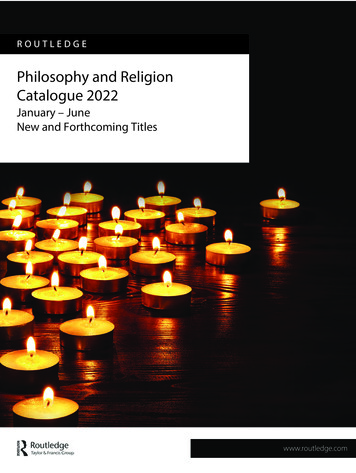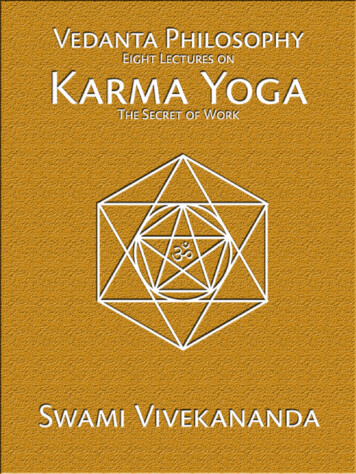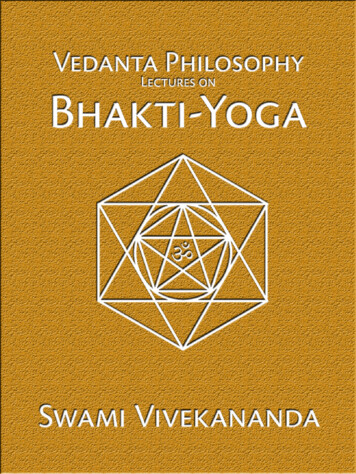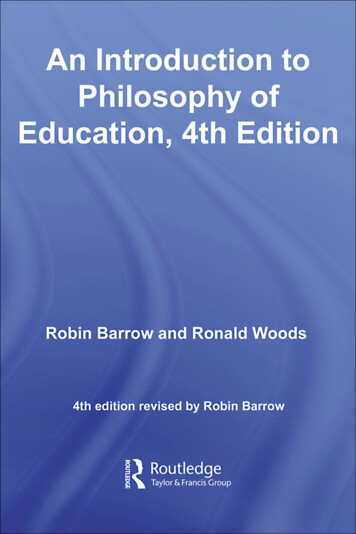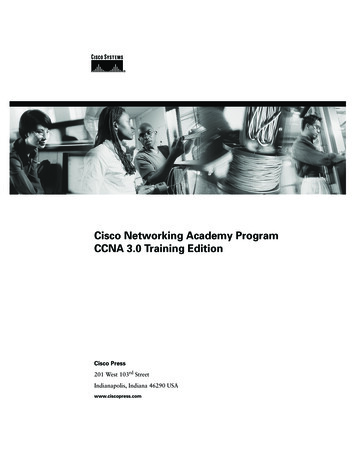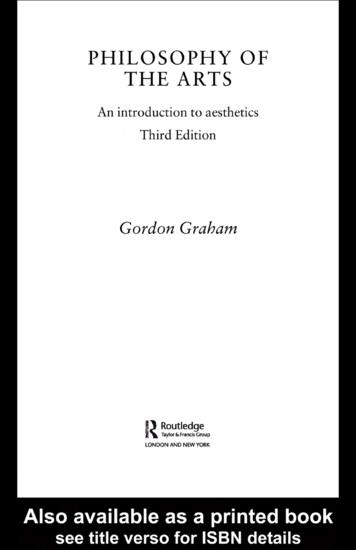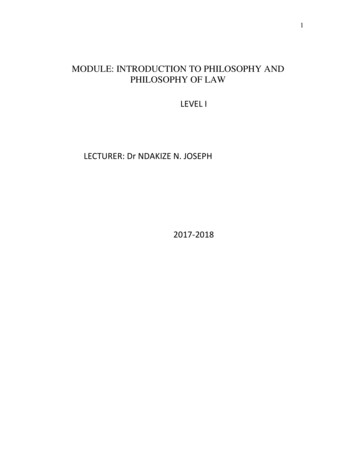
Transcription
1MODULE: INTRODUCTION TO PHILOSOPHY ANDPHILOSOPHY OF LAWLEVEL ILECTURER: Dr NDAKIZE N. JOSEPH2017-2018
2COURSE OBJECTIVESAt the end of this course, the student will be able:-To define and to explain fundamental philosophical concepts;-To point out the problematic of philosophical thought in general and African inparticular through the periods;-To build strong reflection focused on the problems of human life and those ofsociety and suggest the efficient solutions on the issues of actual world;-To apply correct reasoning based on logical rules;-To acquire appreciative judgment and the sense of value from the strong criticalreflection;-To apply critical reflection on specific domain of knowledge (hearth, education,culture, literature, society, law, politics, history, environment, science andtechnology, etc.EXPLANATION OF THESE OBJECTIVESAcquiring of knowledge of philosophical domain:A. Historical evolution of philosophyB. The main doctrines of philosophical thought ( physical nature or cosmos, theconstitution of the matter or essence, existence, human being, society, freedom,God, the good, the evil, truth, reason, etc.).To initiate the student to philosophy: means:-To learn how to think, to reflect, to reason by himself, to conclude in order toform the outlook of the world based on the scientific knowledge and moderntechnologies,-To take action with full conscience of the aim or the sense;-To initiate him to think about himself and his own problems and experiences;-To reflect on the issues of world (universe) of his period and his place.This initiation implies the adoption of a correct behavior, attitude or the manner of beingand acting.
3COURSE OUTLINEI.INTRODUCTION1. Course outline2. Bibliography3. Definitions of main concepts4. Object of philosophy5. Method of this course6. Subdivisions of philosophyCHAPTER ONE: NATURE OF PHILOSOPHYI.1. Common knowledgeI.2. Scientific knowledgeI.3. Philosophic knowledgeI.4. The relationship between philosophy and human sciencesCHAPTER TWO: HISTORICO-CRITICAL BACKGROUND OF PHILOSOPHYII. 1. Ancient Greek philosophyII. 2. Medieval philosophyII.3. Modern philosophyII.4. Contemporary philosophyIII.5. Post-modern philosophyCHAPTER THREE: THE PROBLEMATIC OF PHILOSOPHYIII.1. The problem of knowledge
4III.2. The problem of beingIII.3. The problem of nature and lifeIII.4. The problem of human being and freedom of individual personIV.5. The problem of values and moralityCHAPTER FOUR: THE MAIN TRENDS OF PHILOSOPHICAL THOUGHTIV.1. IdealismIV.2. SpiritualismIV.3. RationalismIV.4. EmpiricismIV.5. MaterialismIV.6. ExistentialismIV. 7. PositivismV.8. Philosophy of the ages of enlightenmentCHAPTER FIVE: AFRICAN PHILOSOPHY AND ITS ORIGINV.1. The origin of African philosophyV. 2. Kinds of African philosophyV. 3. Main trends of African philosophyV. 4. Alexis Kagame and African and Rwandan philosophyConclusionGENERAL INTRODUCTIONThis point contains definitions of philosophy, object of philosophy, Method andsubdivisions of philosophy.1. DEFINITION OF PHILOSOPHY
5It is extremely uncomfortable to give the definition of philosophy, because it constitutesits own mode of knowledge.ETYMOLOGICAL DEFINITIONThe word “philosophy” comes from a Greek word “philosophia” itself is composed oftwo words philia and SophiaPhilia: Love, towards, searchSophia: Wisdom according to its meanings:The practical wisdom, i. e the conduct integral human being, and knowledge or science.The term “philosophy” is said to have been invented by Pythagoras. When he was askedif he was wise (in greck “sophos”), i.e human being passionate to know things. Heanswered, » I am not a “sophos” but philosophos that is to say a lover (philos) ofwisdom (Sophia). From the word philosophos the word philosophy was derived.Philosophy, therefore, means love of wisdom in the sense of search for knowledge andwith the conduct worth of reasonable being.The depth sense of philosophy is science: - theoretical wisdom: knowledge: science- And practical wisdom: conduct, behaviour: integrityIn comparison with other sciences,-philosophy is not a body of knowledge that is enough to transmit.-it is not knowledge in its wholeness or theories strongly constructed that would beenough to explain rationally.-in other disciplines, there is something to learn: in mathematics, logical coherence of theaxioms, in physics, in natural sciences, in history, the event in its entirety that oneattempts to explain rationally.Philosophy is an activity of reflection that attempts to retake and verify the knowledgealready acquired, in order to discover the foundation that constitutes them. The hallmark of philosophy is centered in the argument. The major task of philosophy isto analyze and construct arguments.
6Philosophers clarify concepts, analyze and test propositions and beliefs.It should result in wiser vision of life in which the impartial use of reason results inappreciation of other viewpoints.Human mind is characterised fundamentally by the concern for complete and profoundknowledge of each and everything that is.Being conscious or not, a human being undertakes a reflective activity (which isthoroughly philosophical) when he asks himself about the actual knowledge or the actionthat is undertaking.Here it is a philosophical activity in its proper sense: A kind of withdrawal or retake of adistance in regard to what one does, says, or produces.When a knowledgeable person (a scientist) elaborates a new theory of knowledge, heimmediately asks himself on its ultimate meaning, or in regard to the entire knowledge.Hence, there are 3 attitudes that characterises a philosopher1) Wonder: this is astonishment before reality when one discovers that things aredifferent from the way they appear to him.2) Doubt: attitudes that consist in analysing truths considered as evidences or theopinions commonly admitted.3) Consciousness of death: the understanding that man is being doomed to die incitesman to reflect on himself, on his existence and on his destiny.It is also important to distinguish three focuses of interest of philosophical reflection-Focus on philosophical systems or theories already established.-Focus on scientific knowledge already constituted-Focus on personal experience of Human being (the situations, limits failures, death andsuffering )Philosophy is a method of thinking, the activity of the mind that takes interest in externalworld (physical world of the other.) and in internal world of the subject itself wherebythe subject is considered itself as the object of the study in order to search for intimatenature or essence of things.Philosophy also treats the absolute (GOD ) in order to determine his mode of existingthat is different from other existing ;being such as humans , living and inanimate beings .
7Philosophy embraces the real entirely. But of which manner, how to embrace the real?Here it is issue of method. This method transforms itself in the object of study.Material object of study of is whatever exists. The formal object of philosophy searchesin that real the profound reason of being, the ultimate why or the profound cause or firstprinciple of things, or beings (inanimate, living and humans), essence or substance.-In human being: it is the soul-In the living beings: it is spirit or the vital principle-In the universe: it is the movement and change- Some material elements: FIRE, WATER, AIR- God creator and providence- The universal mind or the Logos that organises everythingSynthetically, two definitions of philosophy.Broad meaningPhilosophy is an outlook of individual or social world. Each person has knowledge fromeducation or experience, from diverse realities of the world and from himself.He raises questions in relation with practical life or daily conduct. He wants to give ananswer to question raised by daily experience. This reflection gives him a certain worldview.Narrow meaningBeyond general sense and confronted to the situations of existence such as death, failure,mistakes, suffering A Human being asks himself the question of fundamental why ofeverything that is.1) Philosophy starts with wonder before whatever exists. (Reality)2) It makes critical analysis of the acquired knowledge3) It raises the question of foundation of whatever exists4) It unifies its knowledge in a complete synthesis (philosophical synthesis).
85) It aims, in this sense, at attaining of radical absolute and total knowledge of reality.Object of philosophyThe object of philosophy is the reality in its totality. Reality consists in world, humanbeing, and the absolute (God). Philosophy leaves nothing untreated outside its domain. Itdeals with whatever is present to our experience, sensible objects, events, ourselves,God Philosophy pays much attention to crucial problems of such as nature, existence, humanexistence, evil, human soul, human freedom As in each science, philosophy has material object and formal object.The material object of AG science is the object that science studies in common with othersubject (science).For instance: Nature is the material object is common to several sciences.Formal object of a science is a partial or proper object of each science. It is the point ofview that a science chooses in order to study it profoundly.Biology for example: studies the aspect of life (living beings) of the entire naturewhich is its material or common object.Material object of philosophy takes interest in whatever exists, reality in general.However, in reality philosophy seeks to understand the fundamental causes or firstprinciple which is at the essence of whatever exists (or which makes them to exist) wecan say that philosophy strives to know the why of every thing: the main reason of theexistence of thing in opposition to experimental or positive sciences which deal with thewhy of things but in narrow and limited way.Treated in this angle of its object, philosophy can be defined as knowledge of thingsthrough their first causes by natural reason.Explanation of this definition-knowledge: it is knowledge through the causes. This knowledge is scientific in the sensethat it aims at truth (even though it does not deal with objectivity like in other science).
9-Things (objects): these are beings: plants, animals, human beings, events the cosmosand inanimate beings such as stones, rocks and wood.-Through the first cause or ultimate (depending on the point of view where one isplaced).Philosophy does not ignore the second cause but there are not its main interest.Philosophy seeks to know the first or ultimate cause of every thing I.e. fundamentalreason of being of all things.-By the light of natural reason:Philosophy uses pure reason or intelligence. It does not use the instrument ofobservation or the measure in order to get accuracy as in other sciences or faith andrevelation like in theology. It instrument is natural reason.Synthetically we can consider 3 definition of philosophy.-As critical reflection: According to Socrates.-As art of living: Socrates, Stoics and Epicureans-As absolute knowledge or metaphysic presocrate; Descartes and Leibniz.However, philosophy can also be defined as an attempt of rational, critical and systematicreflection based on Man and his situation in the world.3. Method in philosophyContrary to scientific method that consists in observation of facts, in hypotheses andexperimentation, philosophical method is essentially reflective. It starts from the objectthought and back to the subject. The philosophical reflection is critical.Philosophy starts with wonder and doubt. It accepts nothing as true or evidence. It rejectevidence and opinions.This reflection is radical and broad.Broad: philosophy does not deal with particular facts, but it studies the objects globallyand universally.It does not study Jean Pierre, Jean or Claude but it studies a human being not such a tree,animal and tree.It seeks to grasp the nature of being of human or of plants.
10Radical: philosophy goes up to the roots of things in order to discover the foundation orthe sense of these things.DIVISION OF PHILOSOPHY1. Division according to knowledge:-Epistemology: deals with the fundamental nature of scientific knowledgeand its existential condition-critique of science: attempts to fix the true sense and exact value of thesesciences.-formal logic and material logic: it sets the correct use of reason2. Division according to being: i.e. whatever is .it is to the totality of all beings ingeneralbyconsidering each being in the total synthesis.-general metaphysics or anthology: studies being as such.-theodicy: studies the being of God3. Division according to nature:-philosophy of nature: it deals with the fundamental constitution ofparticular beings that are in the domain of human experience.-cosmology: studies the cosmos or universe.CHAPTER ONE: NATURE OF PHILOSOPHY
11The problem treated in this chapter is that knowing the profound meaning of philosophyin opposing it to other modes of knowledge. In fact, it is commonly admitted thatphilosophy is science. But we ask ourselves: is it very scientific knowledge? And is itvery philosophical knowledge?1. COMMON KNOWLEDGECommon knowledge is imperfect and superficial knowledge that proceeds hastilywithout systematic order and control. This kind of knowledge is characterised by:-Lack of criticism and absence of precision in manner of observing-Ignorance of precise object of study-Inability to make plausible (acceptable) hypothesis.It is knowledge of common.Despite its imperfect feature, common knowledge has great importance because itconstitutes the starting point of any kind knowledge. I t allows a human being to thinkabout his own problems and solutions.2. SCIENTIFIC KNOWLEDGEScience is applied in order to develop the elements of common knowledge. It purifies,improves and brings common knowledge to the high degree of perfection, byproceeding with proper method in search for explanation and science puts commonknowledge in logical order.Science is therefore a body of knowledge, true explanation of reality obtained bymethodical procedures and constituted in a coherent system. This kind of knowledgeis centered on truth and search for a method; Truth obtained, is found condensed insystem in which all elements are logical.Scientific knowledge is characterised by:-Critical analysis and precision in manner of observing (method);-The knowledge of universe and causes of which one is witness (object);-Ability to make plausible hypothesis (results)Because of the variety of subjects that it treats of specialisation to which the mindobliges, science has been divided into particular sciences.
12A Mathematical sciencesMathematical sciences deal formally with quantity and not the nature of their objects.Fundamental mathematical notion are sometimes treated without taking reality intoconsideration.EXAMPLE: 2 2 4; x x 2x.The principles of mathematical sciences are sometimes postulates (assumptions), areverified by their deductive character reveals the laws of deductive reasoning. Deductivereasoning is a form of reasoning that starts from the laws to facts or from principles tocases.These mathematical sciences consider the objects from the point of view of numbers,their form and position in the space.Besides mathematical sciences, there are physical, chemistry, zoology, botanic, etc.These sciences are commonly called experimental sciences.B Experimental sciencesThese sciences base themselves on the data of sensible experience and take strictlyempirical character. They deal with observable and sensible phenomena. They reach theformulation of laws by inductive method i.e. a form of reasoning which concludes fromfacts t o laws, from particular cases to principles. This kind of reasoning is opposed todeduction.There are two methods that help experimental sciences to study phenomena:Observation: consistsattentionally in the observation of phenomena in the way theyappear in nature.Experimentation: consists in making a phenomenon in order to observe it. A scientist canchange the conditions in which phenomenon is produced. He must determine the laws. Atthe end, he must formulate a theory which the summary of all laws.3. PHILOSOPHICAL KNOWLEDGE
13According to what we have already seen concerning positive sciences, we notice that theydo not answer all questions that a human being asks himself that, there is, consequentlyintellectual domain that is not studied by these sciences.On the other hands, they are only applied in the domain of observable and sensiblephenomena. Therefore their object of study is limited.Thus, it is indispensable to study other aspects of reality. How to explain the existence ofbeings, life and death, how are matter and soul distinguished? What is their origin andtheir end? These are problems that surpass positive sciences because they are set beyondthe sensible and experience.It is necessary then to conclude to the existence of knowledge which gives answer toultimate why that preoccupies human spirit. This knowledge is philosophy. It proceedswith a method and puts the acquired results to systematic order, which gives it scientificcharacter. Philosophy applies itself to natural order referring to nature faculties ofknowledge i.e. natural reason (sensible and intellectual knowledge).Philosophy differs also from religion. The later is based on revelation and faith.Physical world and its phenomena ( object of experimental sciences) constitute equallythe object of philosophy.A human being: composed of body and soulGod is an Absolute Being.Comparison with particular sciences which deal with class or limited parts of the objects,with the exclusion of others, philosophy is called universal because it deals with universalreality. Its formal object is the search for fundamental reasons of beings. Thephilosophical reasons (the why of philosophy) are not experimental, but meta-empiricalor super sensible.ConclusionWe can make summary of the notions in the followings terms:1. Common knowledge or ordinary knowledge has several imperfections2. Scientific knowledge surpasses the common knowledge, because it provides theaccurate and true explanation obtained by method procedures and constituted in acoherent system.
14Sciences can search for explanation in order which is strictly experimental and discoverthe laws that govern these phenomena. This kind of investigation leads to experimentalsciences.Furthermore, science considers the objects only from point of view of quantity. We getthen mathematical sciences.Finally, it is possible to know reality in super sensible manner, and search for the metaempirical explanations. This is philosophical enquiring or philosophical knowledge.Philosophy is therefore, knowledge that deals with its objects under a special angle of itsdeepest cause aiming at reaching the first principle.4. HUMAN SCIENCES AND PHILOSOPHYWhen we talk of human sciences, one thinks generally about sciences of nature: Physics,Chemistry, Astronomy, etc. But there are other sciences that are quite important andwhose object is man himself. These sciences are called Human sciences or Sciences ofMan or Anthropology in general ( History, Sociology, Psychology A. OBJECT OF HUMAN SCIENCESHuman sciences have as their object of study “man” or realities where mental or spiritualactivity is manifested and reflected or the facts that attract our interests.It is Man ( human being) as a thinking being , human society and human acts. Thesesciences give us knowledge about a human being through phenomena that reveal hispresence in the world. We can say that there are psychological, historical and socialphenomena.The results (data) of these sciences are statistical. Their laws are rigorous.These sciences are:-Psychological sciences: which concern with the psychological or mental phenomena ofman.- Historical sciences: To which we can relate the facts in period of time.- Geographical sciences: Human, Economic and political geography- Sociological sciences: To which we can relate the social facts.- Juridical sciences: Which concern the rules of law.- Economic sciences: Which concern the economical issues.
15- Political sciences: Concern the politics.B. DIFFICULT AND LEGITIMACY OF THESE SCIENCESThe major issue is that of knowing whether one can study man as spirit which constituteshis originality, which makes him subject and no an object, a thinking subject and no athing among others, endowed with conscience, reason, free-will and freedom.Nevertheless, a human being is not a pure spirit, he has a complex nature, body and souljoined together i.e. corporeal and spiritual nature. He is in constant relation with theworld where he gets external conditions of his concret e existence.Human sciences are legitimate for tree reasons:Objectivity: There have as their object of study “man” considered through historical,social and psychological facts.Method: Human sciences have their special method (often the method of sampling andinterpretation).The explanation of these sciences consists in interpretation and comprehension.Comprehension: Here again we consider, social, historical and psychological facts fromwithin, i.e. in associating these facts to the conscience or human mind.Generality: Despite the degree of subject and the characteristic of elements of “man”(conscience, free will, reason, freedom, etc.) the human sciences take into considerationthe laws that preside to the human facts, but which are not rigorous as in a physicalworld. These sciences make also abstraction to personal views or ideological references.RELATIONSHIP BETWEENThere is a great complementarity between philosophy and human sciences. Philosophyhas a task of thinking about other sciences and in a special way about the sciences thathave a man as their object.The human sciences give the necessary information about human being to the philosophywhile philosophy makes reflection concerns destiny (end of man), reason of being of theworld and the existence of God.
e analysis of definition and the object of philosophy are not enough to understand thetrue nature of philosophy. The overview of his background gives us the complementaryelements for understanding more what philosophy is. Thus, we explore the way by whichthe philosopher thinkers were passed and we see clearly how they treated differentquestions and the answers correspondent they provided.I. GREEK PHILOSOPHICAL ANTIQUITYThe Context of birth (origin) of philosophyThe context in which philosophy came into existence in Greece is more or less complex.First of all, Greece was composed of a certain number of colonies, states or small states.These Greek states were democratic states whereby people expressed themselves freely.His freedom was of expression was at the same time freedom of thought. People of thesestates were not only free from the authorities of states but also free from the gods of thesestates. Also, Athens was a cosmopolitan city that received people of various cultures.Finally, Athens had since a long time developed other sciences such as geography,Mathematics, Geometry, Astronomy Greek philosophy shows us the origin and the evolution of philosophy. This period hasthree phases.-The phase of elaboration of philosophy (Presocratics);- The crisis phase (Sophists);- The phase of maturity ( Plato and Aristotle.1. The phase of elaboration of philosophy: Presocratics;Philosophy in real terms begins with Greek philosophers called presocratics.Two major problems attract their attention:-How t explain the world nature in more rational way;
17-How to explain change and permanenceThe pesocratics make efforts to explain nature using pure reason. They seek toexplain how things are permanent through change (or things change and they remainthe same). They seek also to explain essential constitution of cosmos. Theirexplanation comes from sensiblea. Thales of MiletusAccording to him, fundamental principle is water, it is very where and can have allforms. Water is according to him, they only principle that exists.b. AnaximanderIndefinite is the prior principle. It is the former to water and other elements.c. Anaximenes: Air is the principle or basis of every things. Air is necessary and verysubstle, it is takes many forms by dilatation and condensation.These philosophers are normally called physicists, physiologists or philosophers ofphysical nature. Because the physis or physical element attracts their attention, theytry to give explanation of world by material element that is considered as the basicelement or the archè.d. HeraclitusFor him the reality that exists is change or becoming. He says that every thingchanges. Heraclitus is called philosopher of evolution r pure becoming. According tohim, everything changes, nothing remains static. His doctrine is called monistmaterialism and evolutionistic materialism. After the philosophers above there isParmenides. According to him, reality is unique, there is no change.CONCLUSIONIn relation to what has been said above, philosophy is elaborated in Greece by thethinkers departing from sensible experience. They seek to explain some problems inmore rational way in going beyond the mythical explanation based on gods.SOCRATES (470-399)He lived in the time of Sophists and he opposes to them and to their arguments.Socrates maintains a categorical opposition to sophists. Sophists claimed to possess
18knowledge of everything and they did not believe in truth. Socrates himself professedhis own ignorance and he taught people who listened to him with the aim at absolutetruth. All his work is a work of conversion. He has dressed philosophical thought andturned reason to truth. They seek for the truth and the good (moral good).His philosophy concerns a human being, his moral conduct and his search for truth.Socrates abandoned the problem of the physical nature and the deception of Sophistsat the benefit of truth. According to him, knowledge has a prerequisite for one’smoral conduct. Hence his motto ‘’know yourself’’. His method to attain truthsdialogue and discussion and it is expressed in to insistencesIrony: consists in question that he arises to those who claims to know up to theaffirmation of their ignorance. He arises questions considering himself ignorance inorder to destroy the apparent knowledge of his interlocutors (the sophists).Maîeutic: It is a procedure by which Socrates shows the interlocutors that they possesthe truth without knowing it. The method also used questions in order to discover thetruth that is within an individual without his notice. It is a method delivering the truthby one’s efforts.His ethics: The teaching ethics of Socrates is conditioned by the knowledge. That’swhy his ethics is called moral intellectualism.He was condemned to death by Athenian authority under the pretext that he corruptedthe youth and they offered to him a hemloch poison.Socrates opened the way to philosophy of man. According to him a human beingmatters. Socrates is considered to be the father of Western philosophy.PHASE OF MATURITY: PLATO AND ARISTLE1. PLATOPlato in order to solve a problem of change and permanence , made original thoughtthat there are objects of sensible perception and the objects of thought which do notthe same properties.The objects pf thought: There are ideas; every idea is unique, perfect, eternal andimmutable.
19The objects of sensible perception: These are concrete objects and particular. Theyare individuals, multiple and changeable.Plato makes a distinction of two worlds:Sensible and material world: is the world of sensible and changeable objects. It is theworld known by our senses. It is shadow or a representation of the real world.World of ideas or ideal world: It is the perfect world. This the world recognised bythe intelligence. This is the veritable world that our reason knows whereas sensibleworld is its representation, an efficient reproduction of ideal reality. It is the shadowproject in space.A human being belongs to the two worlds. He is composed of two substances: thesoul and the body. The body is considered as a material thing or prison of the soul.Plato explains all reality through that distinction of material thing and the spiritualreality and two worlds that are different and separated. That explains the dualism ofPlato.The dualism: is defined as a system or doctrine that admits two principles that areirreductible.The idealism: is a system or a doctrine that brings being to thought and things arenothing than the mind.ARISTLE (385- 322)Was a disciple of Plato.His philosophyAlthough Aristotle was a disciple of Plato, his philosophy is more or less opposed tothe philosophy of Plato who is his master. He rejects first the doctrine of the existenceof two worlds. According to him, the sensible world is real. His philosophy isopposed to platonic idealism and appears as a form of realism. Knowledge is not areminiscence of innate ideas but it is the conclusion of the intelligence effort whichattempts to understand the world to classify the objects and make hierarchy of
20common properties of individuals. Aristotle is the father of Logic or “ORGANON”and metaphysics.The concern to explain change and permanence helped Aristotle to distinguish the“coprincipes” or “coprinciples”: form and matter, act and potency, substance anaccident and the 4 causes and the Immovable being mover.The coprincplesThese are the principles considered in couple by which Aristotle used in order todistinguish the problem of change and permanence.1. Matter and FormMatter: is the principle of radical determinability to being. It is by means of that beingrealises the intention. It is substratum of object.Form: This is what gives the determination to being. It is the intention.Act and potencyAct: is the definite realisation or actual state of something.e.g.This is the table in act.Potency: It is a state that being tends
Alexis Kagame and African and Rwandan philosophy Conclusion GENERAL INTRODUCTION This point contains definitions of philosophy, object of philosophy, Method and subdivisions of philosophy. 1. DEFINITION OF PHILOSOPHY. 5 It is extremely uncomfortable to give the definition of philosophy



